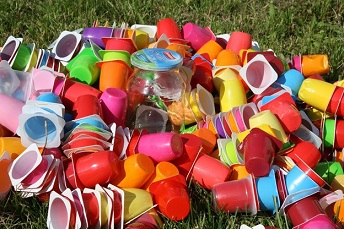 INTERNATIONAL REPORT—Usually around Earth day, the conversation centers around sustainability targets, taking on more environmental responsibility, and raising awareness of the dangers of waste and pollution. This year, things have been different. The COVID-19 pandemic has changed many plans, and people celebrated the 50th anniversary of Earth Day at home. The entire planet is going through an uncertain period, and although other health and economy headlines are under the spotlight, climate actions remain just as important.
INTERNATIONAL REPORT—Usually around Earth day, the conversation centers around sustainability targets, taking on more environmental responsibility, and raising awareness of the dangers of waste and pollution. This year, things have been different. The COVID-19 pandemic has changed many plans, and people celebrated the 50th anniversary of Earth Day at home. The entire planet is going through an uncertain period, and although other health and economy headlines are under the spotlight, climate actions remain just as important.
According to the UN’s Emissions Gap Report 2019, global CO2 emissions need to drop by 7.6 percent this year if we want to keep global heating under 1.5°C, so as stressful as things may seem, now is not the time to abandon the fight. In fact, the United Nations and many environmental agencies are using this opportunity to draw attention to climate issues and suggest clean alternatives.
The Coronavirus gave us a glimpse into what a more sustainable future could look like. It’s difficult to look at the Coronavirus pandemic from a positive perspective, but if it’s one area where it seems to have helped, that area is global CO2 emissions. Because of lockdown restrictions, many factories have had to suspend operations temporarily. In China, carbon emissions were down by an estimated 18 percent between February and early March, while in Europe, it is estimated that CO2 emissions will fall by 400 million metric tons.
At the same time, more people working from home has indirectly caused a drop in air pollution because commuting isn’t as frequent anymore. In general, people all over the world are leaving their homes less often, and although the context is unfortunate, the results are good for the environment. According to a CarbonBrief report, the Coronavirus is set to cause the largest ever annual fall in CO2 emissions—larger than any previous economic recession or war. Apart from factories, the airline transport industry, which remains on halt, has contributed the most to the drop in CO2 levels.
This glimpse into what a cleaner planet would look like was enough to make some want to change their lifestyles. For example, one British survey shows that four out of five motorists plan to walk more after restrictions are lifted to keep the air cleaner.
But, even with data, activists are worried that things will get worse after the pandemic and that what we’re seeing now are just short-term improvements. After China restarts its factories and economies rebound, it’s possible that emissions will go back up and even exceed the levels before the pandemic, as businesses try to make up for the lost time.
Staffing & Logistics Disruptions Affect Recycling Sector
If the Coronavirus pandemic has contributed to lower carbon emissions, the effects on the recycling industry have not been entirely pleasant. Like most other business sectors, recycling has been affected by logistics and staffing issues, so things have been moving slower than usual.
Several European countries have closed their borders and restricted the movement of goods, so it remains to be seen how this will impact collaboration between international recycling units.
Consumer behavior has also had a part to play, especially in the early days of the pandemic, when people bought stored PET bottles instead of returning them and, in some areas, turned to tap water instead of bottled. Europe is still waiting to assess the impact of social distancing on the recycling market, and, according to French waste collectors, we could see shrinking bottled drinks consumption if people will go out less in summer and travel restrictions remain in place.
Meanwhile, the US recycling industry is headed towards a crisis, as the waste generated by panic-buying ends up in the dump because there’s a shortage of active recycling companies to handle it. At the same time, the demand for plastic packaging could increase, especially in the food sector. When ordering takeout, for example, people are now more likely to specifically request plastic packaging for hygiene reasons. However, many people still care about recycling. In Wales, for example, residents are holding on to trash until it can be sorted and recycled because they don’t feel comfortable with it going into an incinerator.
How Do Businesses Spend on Sustainability During the Pandemic?
The Coronavirus pandemic has forced many businesses to take unprecedented measures to cut costs and keep their employees safe, such as shutting down operations completely, closing down certain branches, laying off personnel, reducing production, and pausing non-essential services. Because of the uncertain economic outlook, some small and medium-sized businesses have also focused only on short term goals and delayed all long-term objectives, including meeting sustainability targets.
Investing in recycling and sustainability might not seem so necessary, and companies may be tempted to pivot their efforts, but this may not be the right approach. Waste management companies like Mil-tek continue to be active and advise businesses not to forget about their core sustainability values because the repercussions can be more serious than expected. When employees come back to work, the need for a safe and healthy work environment will be even greater, and companies that fail to dispose of their waste responsibly will be held responsible.
Large companies know this all too well, so even if their staff is working from home, they continue to advance their core sustainability efforts.
Apart from having clear benefits for the environment and cashflow, doing that also helps with customer perception. The Coronavirus pandemic is, in many ways, a test of resilience for businesses, as customers observe how each reacts under pressure. A company that cancels all sustainability targets and no longer cares about its environmental impact will undoubtedly pay the price once the pandemic is over, as consumers will prefer businesses that managed to balance short-term profits and long-term social and environmental efforts.






